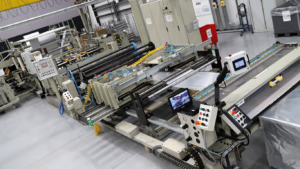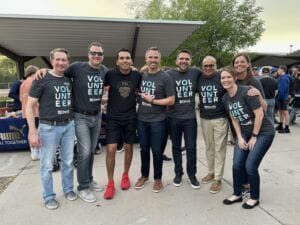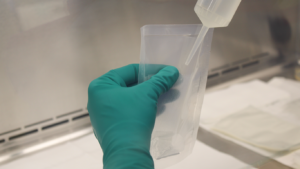On a sunny Saturday morning in southwest Phoenix, around 20 people gathered in a small living room to greet new homeowners who had traveled thousands of miles to be here. They brought tables, lamps, kitchen appliances and TVs for a group of refugees from all over the world.
“We want to say to you, welcome to America,” Mike Sullivan said, as colleague Claudine Postik translated his words to Arabic for the Syrian homeowners. Sullivan is the agency director for the Welcome To America Project, a non-profit organization that provides household essentials, ranging from tables to clothing, to computers and bikes for the recently resettled refugees in Arizona. Claudine Postik, an interior designer who speaks five languages including Arabic, is one of many volunteers who have been on board with the group for years.
READ ALSO: Ranking Arizona: Top 10 immigration law firms for 2021
The organization, which was founded in 2001, operates a warehouse located in Tempe, to sort donation items that serve the refugee communities.
On Sept.29, the group visited three families, who recently resettled here in August from Syria, Sudan and Afghanistan. Every Saturday, the project organizes “Saturday welcomes” events to distribute furniture and household items to newly arrived refugees’ family homes. The staff visits the household in advance of the distribution day in order to learn about which supplies the family needs.
“I was amazed by all the volunteers who are eager to help other people. I was amazed by the positive reactions and the happiness of the [refugees] families when we brought the items to the households,” Postik said. “The kids’ faces lit up when they unboxed the packages, like when they opened Christmas gifts.”
In 2021, the Welcome to America Project served 1,660 individuals and 403 families from 26 countries. The group provided 369 bikes and 145 computers for them, according to its statistics. After distributing the items, Sullivan garnered the volunteers and the staff to spend time with each refugee family before they visit other households.
“Those are the things that we bring, but much more than any physical item is human connection,” Sullivan said.
“Everyone here, please raise your hand if any of you here were born outside of the United States,” Sullivan asked. Five hands raised up. When the questions dated back to the grandparents’ generation, more than half of the room raised their hands.
“We want to let you know that we also come from all the places around the world,” Sullivan said to the homeowners. “You don’t have to leave your culture behind when you come here, by bringing your culture to us, you make our communities better. We are glad that you are safe here. You are welcomed here.”
The refugee families then shared their future plans, expressing their goals for economic self-sufficiency. Overcoming extreme circumstances, coming to the U.S with shattered dreams and their past lives left behind, they hope that their children can pursue continuing education in the U.S, where they call their home now.
“The only difference between a refugee and me is the circumstance,” said Alenga Alokola, a graduate student at the Thunderbird School of Global Management, echoing Sullivan’s words.
By building these icebreakers activities, the organization wants to build genuine connections between the local communities and the refugee communities.
“As I mentioned about trying to turn fear into hope, most people think that I’m referring to refugees’ fear, but that’s only part of it. It’s also the community’s fear because a lot of the community haven’t met somebody that they would, you know, otherwise, think of them as others.” Sullivan said.
In 2022, 100 million people are estimated to have been forcibly displaced from their homes around the world, including people displaced from the war in Ukraine and the Taliban regime in Afghanistan.
As of June 2022, an estimated 15,100 refugees were admitted to the U.S, according to the U.N. Refugee Agency’s report.
“They did not choose us, we chose them,” said Kevin Groman, the organization’s board president, explaining the refugee admission process.
Arizona ranks the fifth refugee recipient state across the U.S. There are 4,331 refugees in Arizona in 2022, with more than half of them from Afghanistan, according to the state’s refugee arrivals report.
“I think most people from Phoenix will be surprised to realize how many refugees had been resettled in Arizona, and what kind of thriving and interesting communities they have,” said Dr. Pamela DeLargy, an ASU Professor, who was the senior advisor to the U.N. Special Representative for Migration.
There are many federal and local resources that support refugees’ lives in America. The Refugee Act of 1980 established the Federal Refugee Resettlement Program to assist refugees with economic self-sufficiency after their arrival in the U.S.
In 2021, Gov. Doug Ducey released a statement to affirm Arizona’s commitment to resettle Afghanistan evacuees into their new homes.
“Individuals that arrive in the U.S through the refugee resettlement program are vetted and approved by the national security agencies and granted legal entry into the
country”, according to the press release. On the state level, the Arizona Refugee Resettlement Program partners with resettlement agencies, four in Maricopa County and four in Pima County, to serve as refugees’ first point of contact and primary service provider.
The agencies normally reach out to non-profit organizations like the Welcome To America Project for additional help to refugees. It is one of many local non-profit organizations that provide support for resettled refugee families in their first three months in the U.S.
Local communities expressed enthusiastic support for their new neighbors.
“It’s a great asset for Phoenix. We attract a lot of international business now because we have people who speak a lot of different languages and understand so many different cultures,” DeLargy said. “That is exactly why there has historically been this bipartisan support for refugee resettlement in Arizona.”




